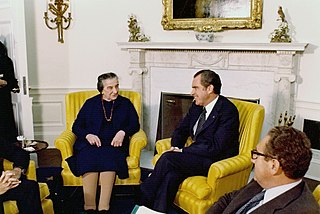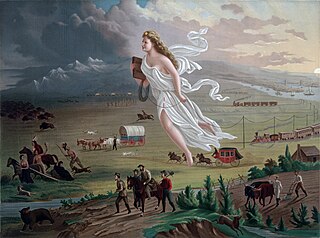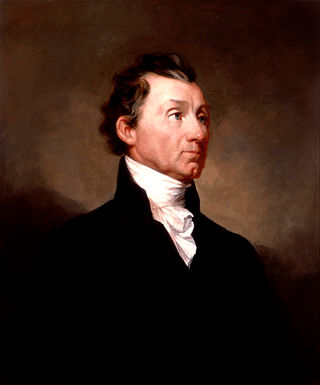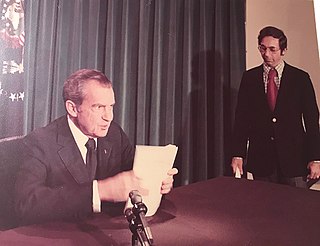Related Research Articles

James Monroe, a Founding Father of the United States, served as its fifth president from 1817 to 1825. He was the last Founding Father to serve as president as well as the last president of the Virginia dynasty. He was a member of the Democratic-Republican Party, and his presidency coincided with the Era of Good Feelings, concluding the First Party System era of American politics. He issued the Monroe Doctrine, a policy of limiting European colonialism in the Americas. Monroe previously served as governor of Virginia, a member of the United States Senate, U.S. ambassador to France and Britain, the seventh secretary of state, and the eighth secretary of war.
Pax Americana, also called the "Long Peace", is a term applied to the concept of relative peace in the Western Hemisphere and later in the world after the end of World War II in 1945, when the United States became the world's dominant economic, cultural, and military power.

The Bush Doctrine refers to multiple interrelated foreign policy principles of the 43rd President of the United States, George W. Bush. These principles include unilateralism, preemptive war, and regime change.

The Nixon Doctrine was the foreign policy doctrine of Richard Nixon, the 37th president of the United States from 1969 to 1974. It was put forth during a press conference in Guam on July 25, 1969, by Nixon, and later formalized in his speech on Vietnamization on November 3, 1969.

The Reagan Doctrine was a United States strategy implemented by the Reagan Administration to overwhelm the global influence of the Soviet Union in the late Cold War. As stated by US President Ronald Reagan in his State of the Union address on February 6, 1985: "We must not break faith with those who are risking their lives—on every continent from Afghanistan to Nicaragua—to defy Soviet-supported aggression and secure rights which have been ours from birth." The doctrine was a centerpiece of United States foreign policy from the early 1980s until the end of the Cold War in 1991.

"Manifest destiny" is a phrase that represents the belief in the 19th-century United States that American settlers were destined to expand westward across North America, and that this belief was both obvious ("manifest") and certain ("destiny"). The belief is rooted in American exceptionalism and Romantic nationalism, implying the inevitable spread of the Republican form of governance. It is one of the earliest expressions of American imperialism in the United States of America.

Big stick ideology, big stick diplomacy, big stick philosophy, or big stick policy was a political approach used by the 26th president of the United States, Theodore Roosevelt. The terms are derived from an aphorism which Roosevelt often said: "speak softly and carry a big stick; you will go far". The American press during his time, as well as many modern historians today, used the term "big stick" to describe the foreign policy positions during his administration. Roosevelt described his style of foreign policy as "the exercise of intelligent forethought and of decisive action sufficiently far in advance of any likely crisis". As practiced by Roosevelt, big stick diplomacy had five components. First, it was essential to possess serious military capability that would force the adversary to pay close attention. At the time that meant a world-class navy; Roosevelt never had a large army at his disposal. The other qualities were to act justly toward other nations, never to bluff, to strike only when prepared to strike hard, and to be willing to allow the adversary to save face in defeat.

In the history of United States foreign policy, the Roosevelt Corollary was an addition to the Monroe Doctrine articulated by President Theodore Roosevelt in his 1904 State of the Union Address, largely as a consequence of the Venezuelan crisis of 1902–1903. The corollary states that the United States could intervene in the internal affairs of Latin American countries if they committed flagrant wrongdoings that "loosened the ties of civilized society".
A United States presidential doctrine comprises the key goals, attitudes, or stances for United States foreign affairs outlined by a president. Most presidential doctrines are related to the Cold War. Though many U.S. presidents had themes related to their handling of foreign policy, the term doctrine generally applies to presidents such as James Monroe, Harry S. Truman, Richard Nixon, Jimmy Carter and Ronald Reagan, all of whom had doctrines which more completely characterized their foreign policy.
United States non-interventionism primarily refers to the foreign policy that was eventually applied by the United States between the late 18th century and the first half of the 20th century whereby it sought to avoid alliances with other nations in order to prevent itself from being drawn into wars that were not related to the direct territorial self-defense of the United States. Neutrality and non-interventionism found support among elite and popular opinion in the United States, which varied depending on the international context and the country's interests. At times, the degree and nature of this policy was better known as isolationism, such as the interwar period, while some consider the term isolationism to be a pejorative used to discredit non-interventionist policy.

The Johnson Doctrine, enunciated by U.S. President Lyndon B. Johnson after the United States' intervention in the Dominican Republic in 1965, declared that domestic revolution in the Western Hemisphere would no longer be a local matter when the object is the establishment of a "Communist dictatorship". During Johnson's presidency, the United States again began interfering in the internal affairs of sovereign nations, particularly Latin America. The Johnson Doctrine is the formal declaration of the intention of the United States to intervene in such affairs. It is an extension of the Eisenhower and Kennedy Doctrines.

Pan-Americanism is a movement that seeks to create, encourage, and organize relationships, an association, and cooperation among the states of the Americas, through diplomatic, political, economic, and social means. The term Pan-Americanism was first used by the New York Evening Post in 1882 when referring to James G. Blaine’s proposal for a conference of American states in Washington D.C., gaining more popularity after the first conference in 1889. Through international conferences, Pan-Americanism embodies the spirit of cooperation to create and ratify treaties for the betterment in the Americas. Since 1826, the Americas have evolved the international conferences from an idea of revolutionary Simon Bolivar to the creation of an inter-America organization with the founding of the Organization of American States.

Pro-war rhetoric is rhetoric or propaganda designed to convince its audience that war is necessary. The two main analytical approaches to pro-war rhetoric were founded by Ronald Reid, a professor of Communication Studies at the University of Massachusetts Amherst, and Robert Ivie, a professor of Rhetoric and Public Communication and Culture at Indiana University (Bloomington). Reid's framework originated from inductively studying propaganda. Ivie uses a deductive approach based on the work of Kenneth Burke, claiming that "a people strongly committed to the ideal of peace, but simultaneously faced with the reality of war, must believe that the fault for any such disruption of their ideal lies with others".

Wolfowitz Doctrine is an unofficial name given to the initial version of the Defense Planning Guidance for the 1994–1999 fiscal years published by U.S. Under Secretary of Defense for Policy Paul Wolfowitz and his deputy Scooter Libby. Not intended for public release, it was leaked to the New York Times on March 7, 1992, and sparked a public controversy about U.S. foreign and defense policy. The document was widely criticized as imperialist, as the document outlined a policy of unilateralism and pre-emptive military action to suppress potential threats from other nations and prevent dictatorships from rising to superpower status.

The Monroe Doctrine is a United States foreign policy position that opposes European colonialism in the Western Hemisphere. It holds that any intervention in the political affairs of the Americas by foreign powers is a potentially hostile act against the United States. The doctrine was central to American grand strategy in the 20th century.

The presidency of James Monroe began on March 4, 1817, when James Monroe was inaugurated as President of the United States, and ended on March 4, 1825. Monroe, the fifth United States president, took office after winning the 1816 presidential election by an overwhelming margin over Federalist Rufus King. This election was the last in which the Federalists fielded a presidential candidate, and Monroe was unopposed in the 1820 presidential election. A member of the Democratic-Republican Party, Monroe was succeeded by his Secretary of State John Quincy Adams.
The Obama Doctrine is used to describe one or several principles of the foreign policy of U.S. President Barack Obama. In 2015, during an interview with The New York Times, Obama said: "You asked about an Obama doctrine, the doctrine is we will engage, but we preserve all our capabilities".

On August 8, 1974, U.S. President Richard Nixon delivered a nationally-televised speech to the American public from the Oval Office announcing his intention to resign the presidency the following day due to the Watergate scandal.
The 1952 State of the Union Address was given by Harry S. Truman, the 33rd president of the United States, on Wednesday, January 9, 1952. It was given to both houses of the 82nd United States Congress at the same time. In it, he said these words: "If the Soviet leaders were to accept this proposal, it would lighten the burden of armaments, and permit the resources of the earth to be devoted to the good of mankind. But until the Soviet Union accepts a sound disarmament proposal, and joins in peaceful settlements, we have no choice except to build up our defenses."

The 1824 State of the Union Address was written by James Monroe, the 5th president of the United States. Delivered to the 18th United States Congress on Tuesday, December 7, 1824. James Monroe presided over the Era of Good Feelings. He began with, "The view which I have now to present to you of our affairs, foreign and domestic, realizes the most sanguine anticipations which have been entertained of the public prosperity. If we look to the whole, our growth as a nation continues to be rapid beyond example;" He ended with, "From the present prosperous and happy state I derive a gratification which I can not express. That these blessings may be preserved and perpetuated will be the object of my fervent and unceasing prayers to the Supreme Ruler of the Universe." In the middle of the address, Mr. Monroe said, "There is no object which as a people we can desire which we do not possess or which is not within our reach. Blessed with governments the happiest which the world ever knew, with no distinct orders in society or divided interests in any portion of the vast territory over which their dominion extends, we have every motive to cling together which can animate a virtuous and enlightened people." James Monroe, a founder of his country, predicts that his country will become a world power, and must animate with virtue and enlightenment.
References
- ↑ "Joint Meetings, Joint Sessions, & Inaugurations | US House of Representatives: History, Art & Archives". history.house.gov. Retrieved 21 October 2024.
- ↑ "Fifth Annual Message | The American Presidency Project". www.presidency.ucsb.edu. Retrieved 2024-12-02.